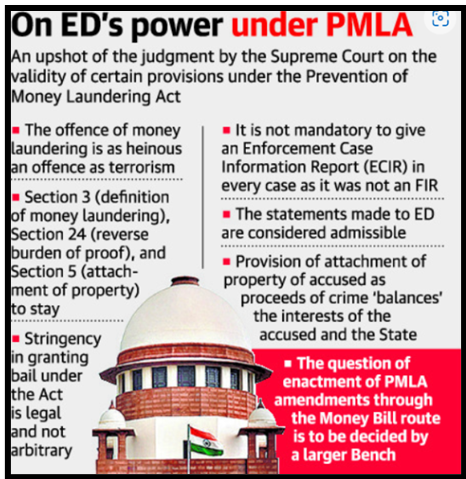Madras High Court Halts Summons
Why in News?
- Madras High Court has granted an interim stay on the Enforcement Directorate’s (ED) summons to five district collectors regarding its probe into alleged illegal sand mining in Tamil Nadu.
- The court asserted that the ED cannot engage in a fishing expedition under the Prevention of Money Laundering Act (PMLA) and must establish the existence of a predicate offence.
Source:The Hindu
Prevention of Money Laundering Act (PMLA)
- Prevention of Money Laundering Act (PMLA) was enacted in 2002 to combat money-laundering, coming into force on July 1, 2005.
Key Provisions
- Proceeds of Crime Restriction: Prohibits the use of crime proceeds for funding activities.
- Definition of “Proceeds of Crime”: Includes any property derived from or involved in money-laundering.
- Enforcement Directorate (ED) Authority: Empowers the ED to investigate and issue preventive orders.
- Confiscation: Allows for the confiscation of property linked to money-laundering.
- Adjudication and Appeals: Establishes Adjudicating Authority and Appellate Tribunal.
Challenges
- Overreach Criticism: PMLA criticized for being overly broad, granting excessive power to the ED.
- Effectiveness Concerns: Criticisms include doubts about the law’s efficacy in countering money-laundering.
- Political Targeting Allegations: Accusations of PMLA misuse for targeting political opponents.
Impact
- International Confidence: Boosts global trust in India’s commitment to curbing money-laundering.
- Financial Gains: Results in the confiscation of substantial assets from money-laundering activities.
- Deterrent Effect: Acts as a deterrent, dissuading criminals from using India for money-laundering.

 Source:The Hindu
Source:The Hindu


